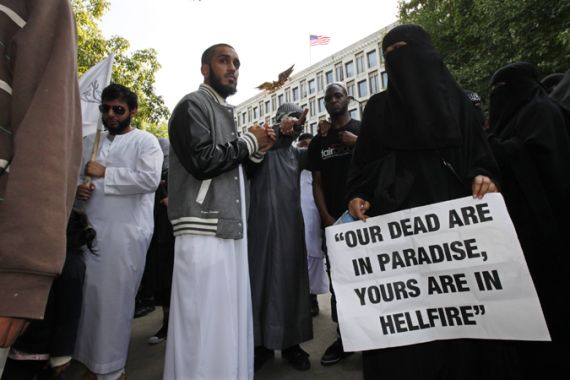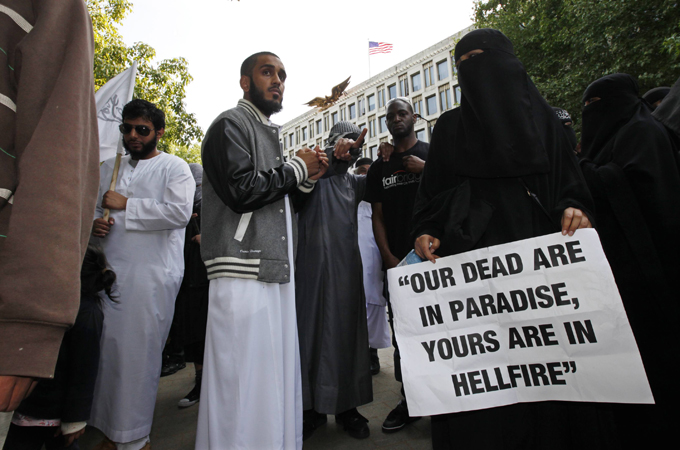The Osama drama: Is the play over?
Bin Laden’s death may not spell the end of al-Qaeda, as actors with smaller roles look to stage further violent scenes.

 |
| Supporters of Osama bin Laden stage a funeral prayer service for the al-Qaeda leader outside the US embassy in London. While overt praise for bin Laden may be in short supply, the sources of his popularity – US military operations across the Middle East and the ongoing occupation of Palestinian lands – remain intact [REUTERS] |
Over the weekend I attended an excellent production of Macbeth by the Singapore Repertory Theatre and was still contemplating the nature of a leader who, in pursuit of his obsession, commits horrible crimes – when I heard the news about Osama bin Laden. At the end of the play, Macbeth is beheaded by the relatives and friends of his victims. Osama, we are told, was shot to death by US Navy SEAL commandos, and the relatives and friends of the victims of 9/11 cheered in New York and Washington.
Shakespeare masterfully explores the warping of a once decent officer, and one wonders how he might have depicted bin Laden: the man of comfortable means who murdered thousands of innocents to advance his goal of re-establishing an Islamic caliphate. Osama was not egged on by a coldblooded, ambitious wife, such as Macbeth. Instead, he seems to have been consumed by perverted faith – a passion to cleanse the Muslim world of its polluters – the United States, Israel, and corrupt Arab rulers.
The protagonist’s body has been dumped in the Arabian sea but is the Osama drama really over? Already skeptics are raising doubts that the body was really bin Laden’s. Will we now start getting reports of Elvis-like Osama sightings? To be sure, the theatre of al-Qaeda was no longer drawing the audience that it enjoyed back in the 1990s and following 9/11.
Bin Laden always said he would like to die a martyr. Certainly, his sympathisers will see his bloody demise at the hands of US agents intruding in a Muslim land as a heroic death – even though most of the world regards it as justice done in ridding the world of a cold-blooded mass murderer. Now that it has emerged that he was unarmed when killed, there will be additional fuel for the “martyrdom” narrative. Could this over-the-hill actor gain a new lease on life – in death?
Tragically flawed Arab leaders – we think of Omar al-Mukhtar in Libya, Gamal Abdel Nasser in Egypt, Yasser Arafat in Palestine – and even Iraq’s Saddam Hussein – are sometimes rehabilitated in death.
Bin Laden’s popular appeal
In our euphoria, let us not forget the sources of bin Laden’s popularity, because they are still there. Partly as a result of Osama’s atrocities, the United States is much more deeply involved militarily across the Middle East than it was before 9/11. US forces are still active in Iraq and, especially, Afghanistan and Pakistan, where drone attacks inevitably kill civilians as well as militants. Israel remains unrelenting in its steady absorption of the West Bank and its siege of Gaza. And we have seen that Arab authoritarian regimes in the Arabian peninsula, Syria and Libya are not going to give up their grip on power easily. Is there a new, unknown, actor out there somewhere, with Osama’s charisma, who might pick up his script and stage new and bloody spectacles?
At the end, bin Laden was an actor without a stage. The US had effectively taken it away from him. And without a stage, he lost his audience. As Richard Bulliet has observed, this one-time master of the new media was denied the video exposure that maximized his arresting personal magnetism. Thus, even though he may have enjoyed the passive support of millions of Muslims chafing at the unending indignities of their present condition, he was unable to mobilise them effectively.
But it was not only the denial of a media platform that marginalised him. It was also his script: to most Arabs and Muslims the idea of a new caliphate enforcing an austere – and not widely accepted – form of Islamic rule was a bloodless abstraction and not very appealing at that. So, while he drew strength by articulating violent resistance against deeply held grievances, he failed to offer, as it were, a “happy ending”.
How galling it must have been for him, isolated in his Pakistani villa, to watch huge audiences across the Arab world following a new and different script. Nowhere in the wave of mass protests that began last December were there banners for bin Laden or calls for a salafi order; nowhere were there chants for violence – even when unarmed protesters were brutally attacked by regime security forces. Osama was upstaged by new actors with a new script and an audience that chose not to sit as passive observers of the political scene – but actually insisted on participation in governance and public affairs.
The final curtain?
The Osama show has come to the end of its run. There are winners and losers. President Obama, of course, is the big winner. He played his role with flawless coolness. Even as the US team was closing in on Osama’s villa, Obama was wowing the big crowd at the foreign correspondents’ dinner in Washington – cleverly teasing a would-be Republican opponent in next year’s presidential election.
The Saudis too will be relieved that one of their own who turned around to bite them, whose operations have actually been funded by Saudi money, has been liquidated. Perhaps they will see the dogged resolve and triumph of the US as an endorsement of their authoritarian status quo – but as US citizens are still debating how to respond to the Arab popular awakening – which embodies democratic principles dear to Americans – maybe they should be cautious. The Israelis, of course, have expressed satisfaction – but they must be a little concerned that the US might conclude that the “war on terrorism” – in which they promote themselves as a front-line ally – is finally “mission accomplished”.
There are also losers, apart from the late bin Laden. First among them are the al-Qaeda affiliates in the Arabian peninsula and North Africa. The loss of their iconic leader must be a blow to their self-confidence. On the other hand, by virtue of their decentralised network structure, they are somewhat insulated; and now that there is a vacancy at the top, some of the second-level activists will be happy to audition for the leading role.
Now is a moment for them to demonstrate their resilience and their relevance: will they – can they – carry out theatrical bloodbaths in response? Among regimes in the region, the Iranians may draw some satisfaction that a prominent anti-Shia figure has been killed, but they cannot be happy that their bigger enemy, the United States, did the deed and will benefit from it. Nor, one suspects, can there be much satisfaction elsewhere among the more nationalist Islamist groups such as Hamas and Hezbollah – despite their differences with al-Qaeda, to see the US bring down their putative comrade-in-arms.
Back in the United States, the Republicans and the Tea Party movement have gamely joined in praising Obama, but they know that they have suffered a body blow in the upcoming presidential election campaign. Finally, last – and least – what will become of the “terrorism industry” in the US and around the world? Will the hundreds of agencies and think-tanks for whom Osama has been, as it were, the chicken that lays the golden egg – now find themselves strapped for new funding? No wonder they are hastening to warn that global terrorism lives on.
The Osama drama is over. Let us hope that there will not be a sequel. As for the man himself, let Shakespeare have the final word:
“Now does he feel his title / hang loose about him,
like a giant’s robe / upon a dwarfish thief.” (Macbeth 5.2)
Michael C. Hudson is the Seif Ghobash Professor of Government and International Relations at Georgetown University. He is currently serving as the Director of the Middle East Institute at the National University of Singapore. He has written, edited and contributed to numerous books including Middle East Dilemma: The Politics and Economics of Arab Integration (Columbia University Press), Arab Politics: The Search for Legitimacy (Yale University Press) and The Precarious Republic: Political Modernization in Lebanon (Random House).
The views expressed in this article are the author’s own and do not necessarily reflect Al Jazeera’s editorial policy.
